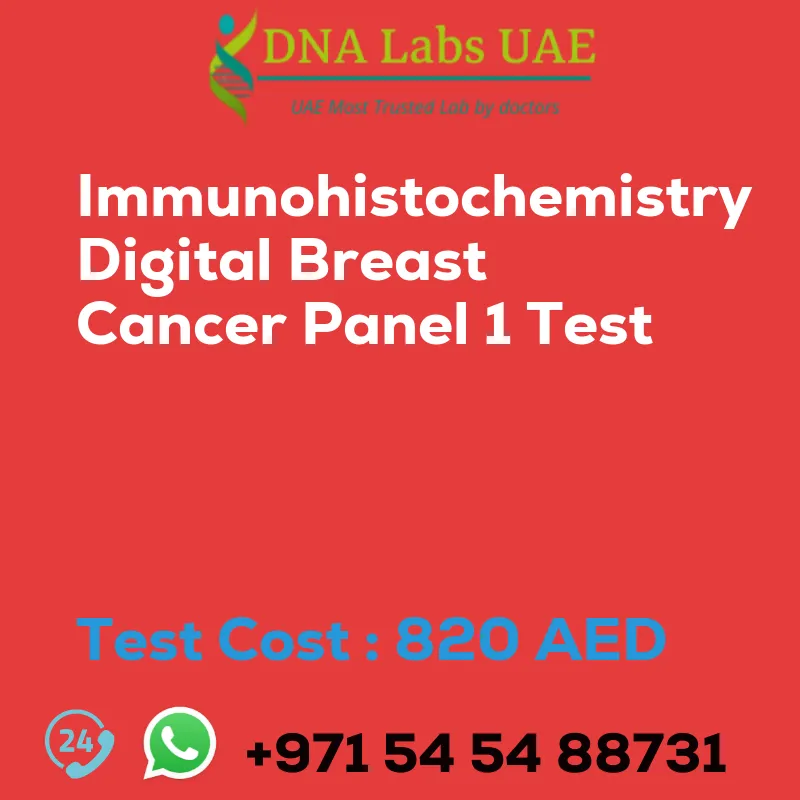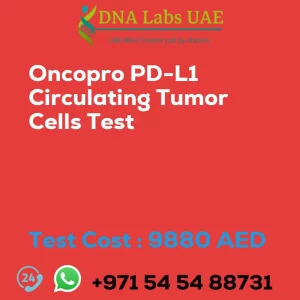IMMUNOHISTOCHEMISTRY DIGITAL BREAST CANCER PANEL 1 Test
Test cost: AED 820.0
Test Components:
- ER
- PR
- Photomicrograph
- Includes pathologist review for presence of malignant cells
Sample Condition: Submit tumour tissue in 10% Formal-saline OR Formalin fixed paraffin embedded block. Ship at room temperature. Provide a copy of the Histopathology report. Indicate site of biopsy and provide Clinical history.
Report Delivery:
- Sample: Daily by 6 pm
- Block: 5 days
- Tissue Biopsy: 5 days
- Tissue Large Complex: 7 days
Method: Immunohistochemistry
Test type: Cancer
Doctor: Oncologist
Test Department: HISTOLOGY
Pre Test Information: Provide a copy of the Histopathology report. Indicate site of biopsy and provide Clinical history.
Test Details:
The Immunohistochemistry Digital Breast Cancer Panel 1 test is a diagnostic tool used to analyze breast cancer tissue samples. It involves the use of specific antibodies to identify and quantify the presence of certain proteins or markers in the tissue. This panel includes a combination of markers that are commonly used to determine the subtype of breast cancer, predict prognosis, and guide treatment decisions.
Some of the markers included in this panel may include:
- Estrogen receptor (ER): This marker helps determine if the cancer cells are sensitive to hormone therapy. ER-positive breast cancers have receptors that bind to estrogen, promoting their growth.
- Progesterone receptor (PR): Similar to ER, PR is a hormone receptor that indicates the responsiveness of cancer cells to hormone therapy. PR-positive breast cancers have receptors that bind to progesterone.
- Human epidermal growth factor receptor 2 (HER2): This marker is associated with aggressive breast cancer. HER2-positive breast cancers have an overexpression of the HER2 protein, which promotes rapid cell growth and division.
- Ki-67: This marker is a protein associated with cell proliferation. High levels of Ki-67 indicate a more aggressive tumor and a higher likelihood of recurrence.
- Cytokeratins (CK): These markers are proteins found in epithelial cells. They help determine the origin of the cancer cells and can differentiate between breast cancer and other types of tumors.
By analyzing the expression levels of these markers, the Immunohistochemistry Digital Breast Cancer Panel 1 test can provide valuable information about the characteristics of the breast cancer, helping oncologists tailor treatment plans for individual patients.
| Test Name | IMMUNOHISTOCHEMISTRY DIGITAL BREAST CANCER PANEL 1 Test |
|---|---|
| Components | *ER *PR *Photomicrograph *Includes pathologist review for presence of malignant cells |
| Price | 820.0 AED |
| Sample Condition | Submit tumour tissue in 10% Formal-saline OR Formalin fixed paraffin embedded block. Ship at room temperature. Provide a copy of the Histopathology report. Indicate site of biopsy and provide Clinical history. |
| Report Delivery | Sample Daily by 6 pm; Report – Block: 5 days Tissue Biopsy: 5 days Tissue Large Complex: 7 days |
| Method | Immunohistochemistry |
| Test type | Cancer |
| Doctor | Oncologist |
| Test Department: | HISTOLOGY |
| Pre Test Information | Provide a copy of the Histopathology report. Indicate site of biopsy and provide Clinical history. |
| Test Details |
The Immunohistochemistry Digital Breast Cancer Panel 1 test is a diagnostic tool used to analyze breast cancer tissue samples. It involves the use of specific antibodies to identify and quantify the presence of certain proteins or markers in the tissue. This panel includes a combination of markers that are commonly used to determine the subtype of breast cancer, predict prognosis, and guide treatment decisions. Some of the markers included in this panel may include: 1. Estrogen receptor (ER): This marker helps determine if the cancer cells are sensitive to hormone therapy. ER-positive breast cancers have receptors that bind to estrogen, promoting their growth. 2. Progesterone receptor (PR): Similar to ER, PR is a hormone receptor that indicates the responsiveness of cancer cells to hormone therapy. PR-positive breast cancers have receptors that bind to progesterone. 3. Human epidermal growth factor receptor 2 (HER2): This marker is associated with aggressive breast cancer. HER2-positive breast cancers have an overexpression of the HER2 protein, which promotes rapid cell growth and division. 4. Ki-67: This marker is a protein associated with cell proliferation. High levels of Ki-67 indicate a more aggressive tumor and a higher likelihood of recurrence. 5. Cytokeratins (CK): These markers are proteins found in epithelial cells. They help determine the origin of the cancer cells and can differentiate between breast cancer and other types of tumors. By analyzing the expression levels of these markers, the Immunohistochemistry Digital Breast Cancer Panel 1 test can provide valuable information about the characteristics of the breast cancer, helping oncologists tailor treatment plans for individual patients. |







